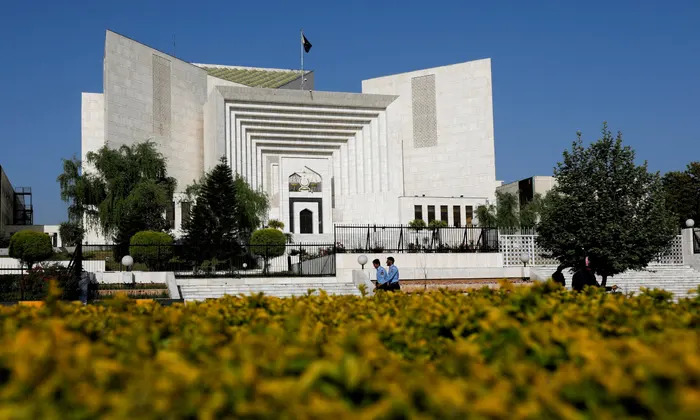The chief justice of Pakistan’s supreme court has stood by its decision to order elections next month in its most populous province, a move that seemingly pits the judiciary against the country’s government and the military establishment.
The court has announced elections in Punjab for 14 May after declaring a delay to the vote unconstitutional and rejecting a petition from the defence ministry to instead hold elections simultaneously across the country later, amid deteriorating security and economic conditions.
Pakistan has drifted into polarisation and one crisis after another since the former prime minister Imran Khan was ousted in a constitutional vote of no confidence in April last year.
Khan has been holding protest rallies across the country to demand a snap election, at one of which he was shot and wounded, but his successor as prime minister, Shehbaz Sharif, has rejected Khan’s demands.
Khan responded by dissolving the Punjab and Khyber Pakhtunkhwa assemblies, the provincial governments where his party, Pakistan Tehreek-e-Insaf (PTI), remained in power, and the supreme court stepped in and directed the elections commission and government to make arrangements for elections on 14 May.
Salahuddin Ahmed, a former president of the Sindh high court bar association, said there was now “a serious risk of martial law” if no side backed down.
“Historically, whenever there has been a constitutional and political deadlock in Pakistan, the military acted opportunistically,” he said.
Michael Kugelman, a director at the South Asia Institute at the Wilson Center, said that in defying the defence ministry and, by extension, the powerful military, the judiciary was showing how determined it was to hold firm on its position.
“But the other side, referring to the military, isn’t backing down either. So it’s become a game of chicken, with no end in sight,” Kugelman said.
The chief justice, Umar Ata Bandial, ordered the government in an earlier hearing on Wednesday to find a consensus with the Khan-led opposition party for a later date if they wanted a delay, but the head of the ruling’s coalition’s Pakistan Democratic Movement (PDM), Maulana Fazlur Rehman, criticised the judges, saying: “We don’t accept the tyranny of the judiciary.”
Ahmed said it was a “lose-lose situation” for the supreme court. “The bench is faced with an adamant government and military. But if they back-down now, especially after meeting top military officials, the bench will be faced with allegations that they were cowed down by the military,” he said.
Kugelman said the current standoff was set in motion by Khan, who could have focused on preparing for elections after his removal from office.
“Instead, he rejected his ouster – though it was a constitutional move – alleged a global conspiracy, galvanised his base, and dissolved two provincial assemblies in a gamble to get early elections,” he said. “But he rolled the dice and lost, and now it’s landed the country in a constitutional crisis – a dangerous distraction amid an economic meltdown and resurgent terrorism.”
He added: “This latest crisis is about upholding the constitution. The judiciary believes that delaying elections would be unconstitutional. And so if the civilian and military leadership, who are on one page, refuse to hold polls on time, they can be accused of trampling on the constitution, and that’s highly worrisome for democracy.”
Nusrat Javed, an analyst and writer, said he did not believe the government would build a consensus with Khan. He said that if Sharif and his party negotiated with Khan, it would mean a surrender for them, as both parties are fighting over Punjab province.
If the government fails to build a consensus or reach negotiations with the opposition to decide a date for election, the court can disqualify the prime minister for contempt of court, as the court has disqualified premiers in the past.
“It is all a power game with no principles involved in this game,” Javed said. “I do see an institutional implosion and don’t rule out the chances of martial law either. I don’t see elections taking place in near future.”
Source : TheGuardian


